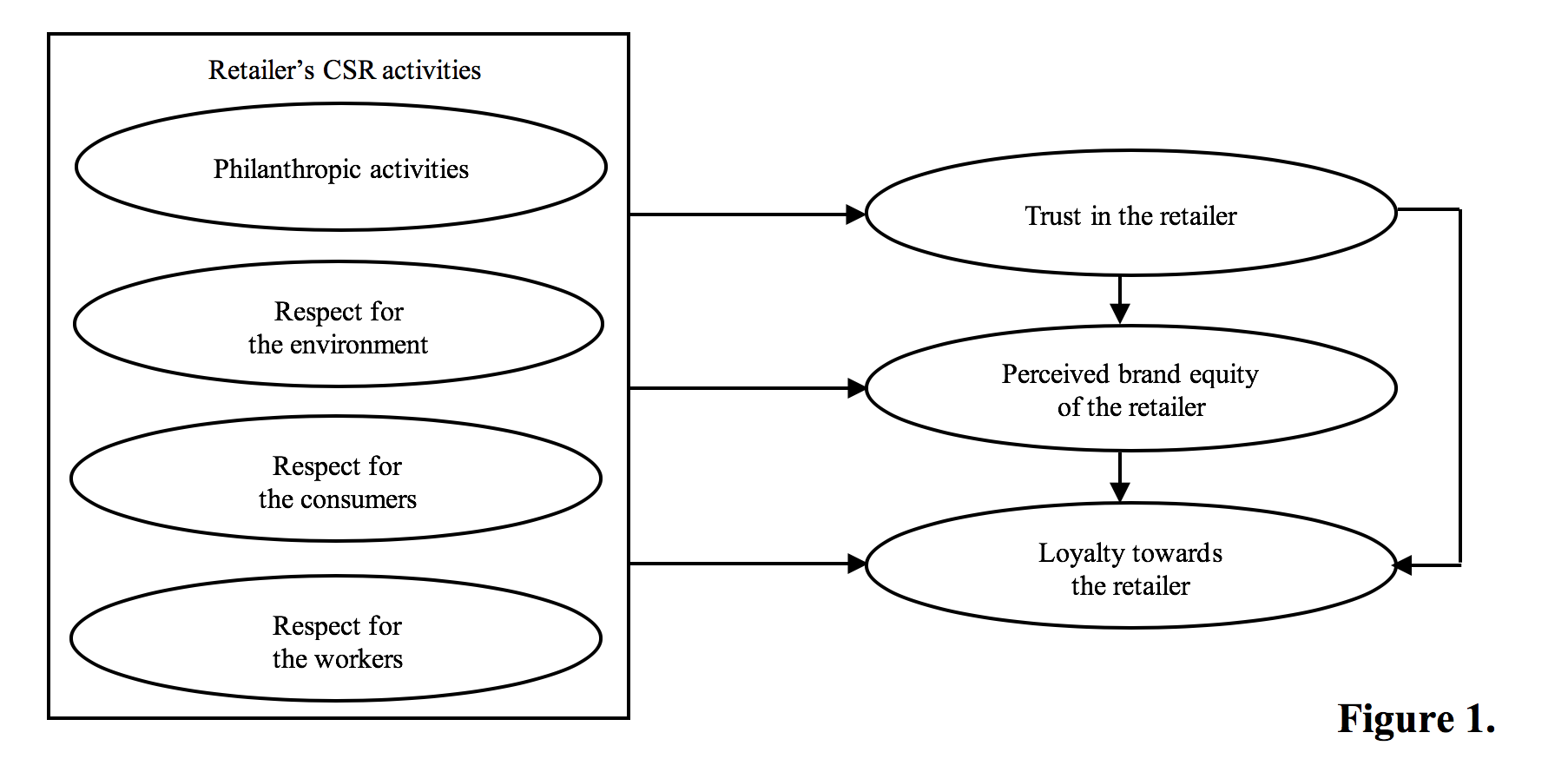Corporate Social Responsibility & Consumer Loyalty
Didier Louis, PhD, Cindy Lombart, PhD, and Fabien Durif, PhD
 Corporate social responsibility (CSR) has gained momentum worldwide. More and more companies are implementing CSR policies, plans and activities, as they believe that CSR will lead to superior business performance as a source of competitive advantage.1 Historically, retailing has not had the reputation of being a leading sector in terms of CSR. Consumers do not spontaneously associate retailing with CSR.2 Nevertheless, retailers are making efforts to communicate their CSR commitments and actions to customers in particular and to society in general.3
Corporate social responsibility (CSR) has gained momentum worldwide. More and more companies are implementing CSR policies, plans and activities, as they believe that CSR will lead to superior business performance as a source of competitive advantage.1 Historically, retailing has not had the reputation of being a leading sector in terms of CSR. Consumers do not spontaneously associate retailing with CSR.2 Nevertheless, retailers are making efforts to communicate their CSR commitments and actions to customers in particular and to society in general.3
Most definitions of CSR are based on two common ideas: 1) companies must respect the law and seek profit, but their responsibilities go beyond these legal and economic responsibilities; 2) companies are responsible to all stakeholders for their activities—not only to their shareholders. According to Mohr et al.4, CSR represents the commitment of a company to minimize or eliminate its harmful effects and maximize its long-term beneficial impact on society.
CSR is generally conceptualized as a multidimensional construct.5 Several typologies coexist in the literature,6 but Moisescu7 conducted a meta-analysis of the various instruments proposed in the literature to measure CSR. Amongst the various dimensions highlighted, four emerged in a large number of works8: philanthropic activities, respect for the environment, respect for consumers and respect for workers.
Our Research
Our research investigates the impact of these four dimensions of a retailer’s CSR activities on consumers’ loyalty towards this seller. Our findings also establish that this relationship is positively mediated by consumers’ trust in this retailer and/or its perceived brand equity. Lastly, our results indicate that this impact depends on the groups of consumers considered: the very responsible consumers (n = 213), the local sceptical recyclers (n = 168), and the least responsible consumers (n = 166). Consumers’ socially responsible consumption behavior, their expectations of CSR activities implemented in companies, their attribution of altruistic motivations rather than strategic motivations to these companies engaged in CSR, and their scepticism towards them are the variables considered to form these groups. Figure 1 depicts the relationships we examine in this study.
The Research Model

A field study was conducted on 547 consumers, who were asked to select a retailer of their choice with which they were familiar (notably with its CSR activities) and to complete a questionnaire with regard to that retailer.
With partial least squares structural equation modelling (PLS-SEM), we show that, for the very responsible consumers, two dimensions of a retailer’s CSR activities (philanthropic activities and respect for the environment) are positively associated with consumers’ trust in the retailer and its perceived brand equity, which relates to higher levels of consumers’ loyalty towards this retailer. For the local sceptical recyclers, only the philanthropic activities dimension of a retailer’s CSR is positively associated with consumers’ trust in the retailer and its perceived brand equity, which relates to higher levels of consumers’ loyalty towards this retailer. By contrast, for the last group, the least responsible consumers, these paths do not work since no dimension of a retailer’s CSR activities has a significant influence on consumers’ trust in this retailer or on consumers’ loyalty towards this retailer. Only one dimension of a retailer’s CSR activities (respect for the environment) has a significant and positive influence on a retailer’s perceived brand equity.
In essence, the fact that a retailer is perceived by consumers as engaged in philanthropic activities has a direct and indirect positive influence (expressed directly through consumers’ trust in the retailer and indirectly through consumers’ trust in the retailer and its perceived brand equity) on consumers’ loyalty towards this retailer for the very responsible consumers and the local sceptical recyclers. Similarly, when a retailer is perceived by consumers as being environmentally friendly, there is an indirect positive influence on consumers’ loyalty towards this retailer. Specifically, this positive effect is expressed through consumers’ trust in the retailer, through its perceived brand equity, and through consumers’ trust in the retailer and its perceived brand equity for the very responsible consumers and through its brand equity for the local sceptical recyclers and the least responsible consumers.
Real Estate Implications
At a managerial level, this research thus indicates that the dimensions “respect for consumers” and “respect for workers” do not have an impact on the variables considered in this research: consumers’ trust in the retailer, their loyalty towards it, and perceived brand equity. By contrast, being perceived by consumers as engaged in philanthropic activities or being environmentally friendly has a positive impact on consumers’ trust, loyalty, and perceived brand equity.
On the one hand, the respect for the environment dimension has a direct impact on brand equity and an indirect impact (through consumers’ trust and/or perceived brand equity) on consumers’ loyalty for all three groups of consumers considered in this research (the very responsible consumers, the local sceptical recyclers and the least responsible consumers). This specific dimension also has a direct impact on consumers’ trust for the very responsible consumers. Consequently, to improve their relationships with these three groups of consumers, firms should implement policies to reduce their consumption of natural resources, make their business activities more environmentally friendly, and make their services eco-friendly. Importantly, they should communicate these efforts to potential and current clients.
 On the other hand, being engaged in philanthropic activities has a direct impact on consumers’ trust and loyalty, and an indirect impact on perceived brand equity for the very responsible consumers and the local sceptical recyclers. Consequently, to improve relationships with these two specific groups of consumers, firms should consider investing locally, to get involved with and promote social and cultural activities within their communities while communicating and sharing this involvement and commitment to CSR with their clients.
On the other hand, being engaged in philanthropic activities has a direct impact on consumers’ trust and loyalty, and an indirect impact on perceived brand equity for the very responsible consumers and the local sceptical recyclers. Consequently, to improve relationships with these two specific groups of consumers, firms should consider investing locally, to get involved with and promote social and cultural activities within their communities while communicating and sharing this involvement and commitment to CSR with their clients.
. . . . . . . . . . . . . . . . . . .
Recommended Reading
Louis, Didier, Cindy Lombart, and Fabien Durif (2019), “Impact of a Retailer’s CSR Activities on Consumers’ Loyalty,” International Journal of Retail & Distribution Management, 47(8), 793-816.
. . . . . . . . . . . . . . . . . . .
References
- Porter, Michael E. and Mark R. Kramer (2006), “Strategy & Society: The Link Between Competitive Advantage and Corporate Social Responsibility,” Harvard Business Review, 84(12), 78-91.
Webb, Deborah J., Lois A. Mohr, and Katherine E. Harris (2008), “A Re-Examination of Socially Responsible Consumption and its Measurement,” Journal of Business Research, 61(2), 91-98. - Elg, Ulf and Jens Hultman (2016), “CSR: Retailer Activities vs Consumer Buying Decisions,” International Journal of Retail & Distribution Management, 44(6), 640-657.
Lavorata, Laure, Ophélie Mugel, Jean-Phillippe Croizean, and Marjorie Allano (2016), “Stratégie Délibérée ou émergente, Utilitariste ou Durable?”, in Lavorata, L. (Ed.), I. Du distributeur au Consommateur, Economica, Paris, 17-31. - Cacho-Elizondo, Silvia and Leïla Loussaïef, L. (2010), “The Influence of Sustainable Development on Retail Store Image,” International Business Research, 3(3), 100-110.
- Mohr, Lois A., Deborah J. Webb, and Katherine E. Harris (2001), “Do Consumers Expect Companies to be Socially Responsible? The Impact of Corporate Social Responsibility on Buying Behavior,” Journal of Consumer Affairs, 35(1), 45-72.
- Rowley, Tim and Shawn Berman (2000), “A Brand New Brand of Corporate Social Performance,” Business & Society, 39(4), 397-418.
- Sen, Sankar and C.B. Bhattacharya (2001), “Does Doing Good Always Lead to Doing Better? Consumer Reactions to Corporate Social Responsibility,” Journal of Marketing Research, 38(2), 225-243.
Carroll, Archie B. and Mark A. Schwartz (2003), “Corporate Social Responsibility: A Three Domain Approach,” Business Ethics Quarterly, 13(4), 503-530.
Swaen, Valérie and Ruben C. Chumpitaz (2008), “L’impact de la Responsabilité Sociétale de L’entreprise sur la Confiance des Consommateurs,” Recherche et Applications en Marketing, 23(4), 7-35. - Moisescu, Ovidiu Ioan (2015), “Development and Validation of a Measurement Scale for Customers’ Perceptions of Corporate Social Responsibility,” Management & Marketing, 13(2), 311-332.
- Maignan, Isabelle (2001), “Consumers’ Perceptions of Corporate Social Responsibilities: A Cross-Cultural Comparison,” Journal of Business Ethics, 30(1), 57-72.
Brunk, Katja H. (2010), “Exploring Origins of Ethical Company/Brand Perceptions – A Consumer Perspective of Corporate Ethics,” Journal of Business Research, 63(3), 255-262.
Öberseder, Magdalena, Bodo B. Schlegelmilch, and Verena Gruber (2011), “Why Don’t Consumers Care About CSR?: A Qualitative Study Exploring the Role of CSR in Consumption Decisions,” Journal of Business Ethics, 104(4), 449-460.
. . . . . . . . . . . . . . . . . . .
About the Authors
Didier Louis, PhD
Professor of Marketing, University of Nantes
Dr. Didier Louis’ (PhD – Burgundy University) research interests center on consumers’ behavior in retail stores, sales promotion, private label, brand personality, sponsorship and corporate social responsibility. His work has been published in leading French journals (Décisions Marketing, Revue Management et Avenir), in international journal (Journal of Retailing and Consumer Services, International Journal of Retail and Distribution Management, Journal of Product and Brand Management), and in a number of national and international conferences.
Cindy Lombart, PhD
Associate Professor, Audencia Business School
Dr. Cindy Lombart (PhD – The Catholic University of Mons) has been a member of the In Situ Lab (Audencia Business School) since 2005 and, since 2017, a member of the GreenUXLab (University of Québec in Montréal (UQAM)). A specialist of consumers’ behavior at the point-of-sale, she conducts experiments, in a real store laboratory, on key retail variables (price, promotions, assortment, store brands, merchandising) and on store and retailer price images. She also focuses on responsible consumption behavior such as the consumption of organic and fair-trade products, of local and regional products, of terroir store brands and ugly fruits and vegetables as well as on retailers’ corporate social responsibility and their CSR images. Her current work integrates new technologies such as virtual reality and thus she conducts experiments in a virtual store. She is the author of publications on these different topics in leading French journals (Recherche et Applications en Marketing, Décisions Marketing, Revue Management et Avenir) as well as international journal (Journal of Retailing and Consumer Services, International Journal of Retail and Distribution Management, Journal of Product and Brand Management).
Fabien Durif, PhD
Associate Dean of Research and Professor of Marketing, University of Quebec at Montreal
Dr. Fabien Durif’s (PhD – HEC Montreal) research interests vary from ethics in marketing to responsible consumption, and most recently to second-hand economy and collaborative consumption. Dr. Durif has published in Journal of Business Research, Journal of Promotion Management, International Journal of Market Research, Journal of Consumer Marketing, European Journal of Marketing, International Journal of Retail & Distribution Management, Technological Forecasting & Social Change, International Journal of Consumer Studies, Journal of International Consumer Marketing, Ethics and Information Technology, British Food Journal, Sustainability and others. He is the Director of the UQÀM School of Management’s Responsible Consumption Observatory, specifically the Observatoire de la Consommation Responsable (OCR), and the GreenUXlab, a research laboratory in new user experiments and in eco-responsibility.